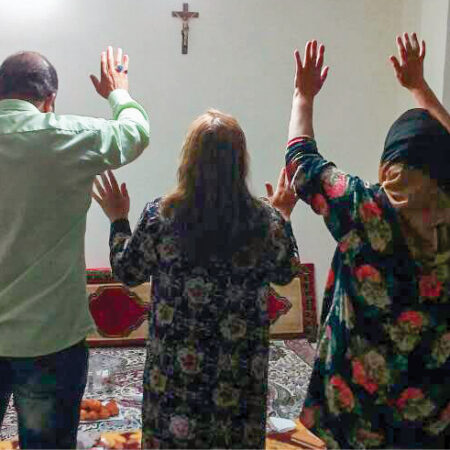Shahrokh came to know Jesus Christ while struggling with drug addiction.
Iran – Summoned by Security Officials
Iran – Summoned by Security Officials
After overcoming his addiction and placing his trust in Christ, the former Muslim began leading his own addiction-recovery group, walking participants through a 12-step program that acknowledges a higher power without mentioning God or Jesus. In Iran, where it is illegal to leave Islam, that’s the only way he can operate.
Group leaders like Shahrokh know that if they are caught leading Muslims to Christ they can be charged with “acting against national security,” a common charge against Christians in Iran. So when an Iranian security official suddenly summoned Shahrokh to his office to discuss his work, Shahrokh had a good idea of what to expect.
The security official knew Shahrokh had become a Christian and wanted to prevent him from sharing his faith with others. He tried to corner Shahrokh with his questions during the interrogation, but the Holy Spirit gave Shahrokh the right words to say.
Surprised by His Boldness

Despite harsh treatment by authorities and a law prohibiting conversion to Christianity, Muslims continue to come to Christ in record numbers in Iran.
Acknowledging his role as a group leader in the city, Shahrokh told the official that he maintains regular contact with group members as they work to overcome their addiction. And he reminded the official that the group is tied to a well- known international organization that is officially registered in Iran.
Hoping to anger Shahrokh, the official began to criticize those in the group who had come to faith in Christ. But Shahrokh was not intimidated. He simply replied that Jesus seems to be helping Iranians who turn to Him.
“If some of these people turn to Christ for help and for deliverance to help them not return to addiction, then they have not done anything wrong,” Shahrokh told the security official. “You should be happy that these people in our country are no longer taking drugs.”
Drug addiction is rampant in Iran, which has the highest per capita number of opiate addicts in the world. Nearly 3 percent of Iranians older than 15 — more than 2 million people — are addicted to opiates, and many other drugs are widely abused as well.
Angry at Shahrokh’s suggestion that Jesus could help those struggling with addiction, the official showed him a list of 400 recent Christian converts in the city who weren’t addicted to drugs. But Shahrokh, who disciples 80 believers who came to know Christ through the recovery group, assured the official that he did not know those on the list or where the list came from.
“Why are you lying?” the official asked angrily. “If you and your friends have not evangelized them, then how did they become Christians?”
“I am ready to swear on the Bible and with God as my witness that I am not telling a lie,” Shahrokh replied. “If I or my friends were in contact with these 400 people, we would have certainly told you.”
Shahrokh then challenged the official, hoping to get more information about the Christians so he could connect with them. “You give us the addresses of these people so that we can identify them and ask them how they became Christians,” he said.
Surprised by his boldness, the official was finally persuaded that Shahrokh didn’t know the people on the list. He then asked Shahrokh to help him understand who was leading so many Iranians to abandon Islam for faith in Christ. The rapid increase in Muslims turning to Christ is well documented, with an estimated 750,000 to 1.2 million Christian converts living in Iran today.
Shahrokh gave the official an inspired response. “You cannot stop the work of God,” he said. “If a person has a dream of Jesus or [if] God directly reveals Himself in a vision and draws them to Himself, or if he has seen a miracle of Christ and follows after Him, then no one is at fault here. You cannot block the divine methods God uses to meet human beings. You can close Christian social activities and house groups or put Christian workers in prison, but you cannot stop people seeing dreams or visions. You cannot put Jesus Christ in prison. You cannot stop the work of the Holy Spirit. He is at work, and in different ways He reveals the truth to people. Can you change the hearts and inner lives of people where the Lord dwells?”
Affected by Shahrokh’s testimony of God’s power, the official — with a sense of awe on his face — immediately dismissed him.
Since the interrogation, Shahrokh has heard nothing more from Iranian security officials. And while he knows he could be called in again at any time, he has continued leading Iranian Muslims and atheists to Christ as he helps them find freedom from addiction.
Beyond the Enemies’ Plans
Shahrokh is one of many former addicts in his part of Iran who have recently come to faith in Christ and begun work among those struggling with addiction, but not all show his boldness. “There are many others who have been delivered from addiction and who are believers,” said a pastor who works with Shahrokh, “but for family, work or personal reasons [they] prefer to keep their fellowship as individual believers or as families or only with the leaders of the group of 80 [Christians in the recovery group].”
Shahrokh is thankful that the Holy Spirit helped him respond wisely during the interrogation and that he is able to continue his work today. Iranians are being freed from their addictions, and God’s kingdom continues to expand throughout the country.
“Glory be to the name of the Lord,” Shahrokh said, “for His wide, great and unlimited work that takes place above the plans of the enemies and politicians.”

